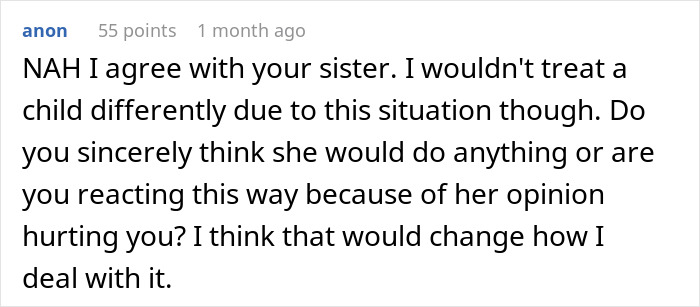Surrogacy has long sparked debate, seen by some as a beautiful path to parenthood, and by others as a controversial use of women’s bodies.
When one man announced that he and his husband were having a baby via surrogacy, most of his family supported them. But his sister wasn’t one of them. She called surrogacy “misogynistic” and “exploitative,” and made her opinion known at every turn.
Now that their baby boy has arrived, she wants to be involved, but he’s decided she won’t be meeting his son anytime soon.
Is he being too harsh, or just protecting his family?
Read the full story below, and don’t miss our conversation with Kayde Mason, a surrogate, doula, and egg donor, about what the surrogacy process truly involves.
The woman spoke out against her brother’s decision to have a baby with his husband through surrogacy

Image credits: daria_lukoiko / Freepik (not the actual photo)
Now that the baby has arrived, the couple is refusing to let her meet him
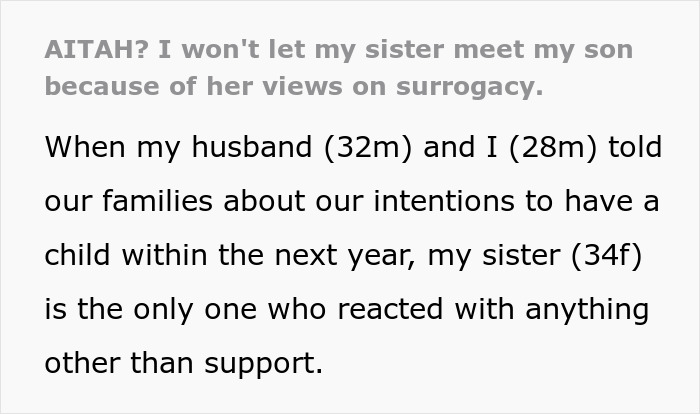

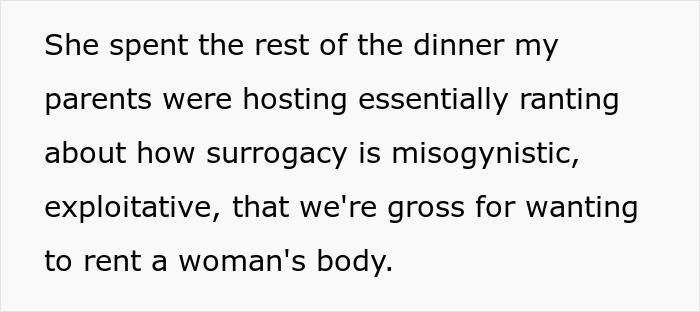
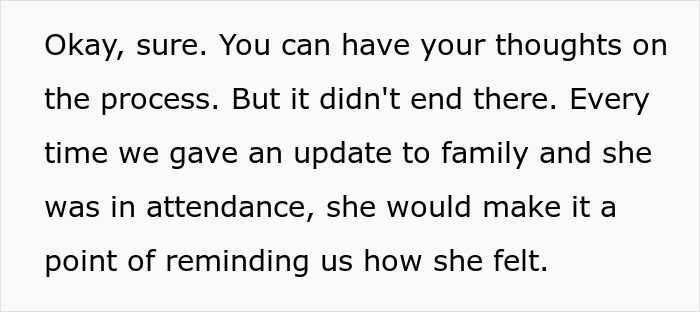
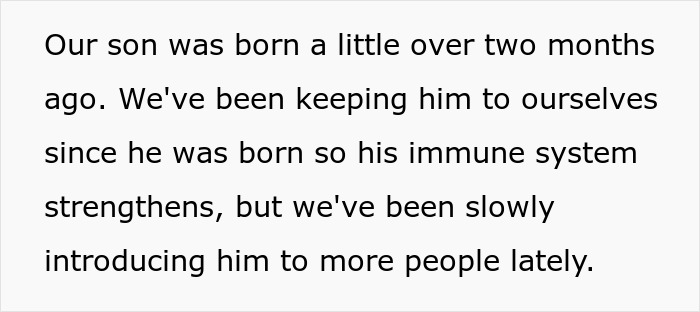

Image credits: The Yuri Arcurs Collection / Freepik (not the actual photo)




Image credits: StockAd8565
What research says about surrogacy
Supporters see surrogacy as a meaningful form of reproductive autonomy, built on choice, trust, and the desire to help someone become a parent. At its core, they argue, it’s about allowing women to decide for themselves what they do with their bodies, including carrying a baby for someone else.
Critics, particularly of commercial surrogacy, aren’t so sure. They worry the process risks crossing a line, treating pregnancy like a transaction and relying too often on women in difficult financial situations. To them, it raises questions about fairness, consent, and whether everyone involved is truly empowered.
Despite how firmly held these views can be, the research landscape is surprisingly thin. While the debate is loud, much of the available data is outdated, and there’s still not enough recent insight into how surrogacy affects the women who go through it or the children born as a result.
Still, here’s what we do know:
A 2014 YouGov poll in the UK found that 59% of British adults supported gestational surrogacy, where a woman carries a child she’s not genetically related to. Just 21% were opposed to the idea. When asked about compensation, 54% supported allowing payments to surrogates, while 26% were against it.
In the U.S., a 2015 YouGov survey found that 71% of Americans approved of surrogacy, with 57% also supporting the idea of compensating surrogate mothers.
Across the globe, attitudes vary.
In Japan, for example, a 2014 study showed that just under 41% supported gestational surrogacy, with higher approval among people facing infertility themselves.
Sweden takes a stricter stance, surrogacy in any form is illegal there, although Swedish citizens can pursue it abroad.
Even so, a study of healthcare professionals, most of them women, revealed that around 60% supported legalizing surrogacy. That said, many also voiced concerns about the children: 64% believed they might not be as healthy as others, and 21% worried about risks to mental health and social stigma.
Elsewhere, some countries have drawn a clear legal line. France, Germany, Spain, and Italy ban all forms of surrogacy. In fact, Italy went a step further in 2024, making it illegal for citizens to seek surrogacy even outside the country. Australia, China, and Thailand also prohibit commercial surrogacy.
What about health outcomes?
One of the most comprehensive reviews to date was published in 2015 by Söderström‑Anttila and colleagues.
Drawing from over 1,700 studies, many based on long-term research led by Susan Golombok and her team at the University of Cambridge, the findings were reassuring. There was no clear evidence of physical or psychological harm to children born via surrogacy.
That said, newer large-scale global studies are still needed. But so far, the research we do have points toward largely positive outcomes.

Image credits: monkeybusiness (not the actual photo)
How do surrogates feel about the experience?
At the center of all this are the women who actually live through it, the ones taking hormone treatments, attending medical appointments, going through pregnancy and birth, and then handing the baby over to someone else.
And many of them say they wouldn’t have it any other way.
A 2024 study published in Human Reproduction followed surrogates for nearly two decades after their first time carrying for someone else. Most described it as meaningful, emotionally rewarding, and something they took real pride in.
A 2023 survey by Surrogacy First found similar results: 8 out of 10 surrogates reported being “satisfied” or “very satisfied” with the overall experience. An impressive 83% said they’d consider doing it again.
And despite the assumptions often made, most U.S. surrogates aren’t in vulnerable or desperate circumstances. In fact, the data shows a very different picture. On average, they:
- Earn more than the average income in their state
- Have higher-than-average education levels
- Are employed and have health insurance
- Choose surrogacy primarily for altruistic reasons

Image credits: LightFieldStudios (not the actual photo)
“A loving family now exists because I was willing to step up and help”
To gain a firsthand perspective, Bored Panda spoke with Kayde Mason, a surrogate, doula, egg donor, and mother to her own children, who generously shared her story and her thoughts on the ongoing criticism surrounding surrogacy.
“After having my own children I knew I wanted to work in this field, close to the birth experience with women for as long as I could. I supported growing families as a birth doula and attendant in labor and delivery for many years and in doing so became familiar with surrogacy,” Mason told Bored Panda.
“As soon as surrogacy came on my radar, it was like a lightbulb went off—this was something for me.”
Mason says her own pregnancies were fairly straightforward, though she admits she’s far from “the model pregnant woman.” Still, the idea of becoming pregnant again wasn’t what drew her in, it was something else entirely.
“Rather than a strong desire to be pregnant again, surrogacy was appealing to me more for two other reasons. First, it allowed me to experience birth, a process I find deeply transformative and empowering, and new parenthood from a unique angle,” she said.
“Second, it was a way to have a deep and profound impact on another person. I’m not religious. I believe we’re put on this earth, as my friend Whitney says, to love on and help make life a little bit easier for the people around us.”
“Being a surrogate has been one of the most meaningful experiences of my life. It is the thing I am most proud of,” Mason stated.
“A loving family now exists because I was willing to step up and help.”
She also says the experience had a positive impact on her own children, teaching them important values. They saw that families can come in many forms and that showing compassion and choosing to help others can leave a lasting mark.
And no, she didn’t feel sad about “giving the baby away.”
“The baby was not genetically related to me and was never mine to begin with. I was just her temporary home and gave her back into the arms of her daddies, not ‘away’,” Mason revealed.
For her, it felt more like a partnership than a sacrifice.
“I did the job I was supposed to do, a job that her dads could not. I grew to love her dads, and through that, love her, but there was never any confusion about the fact that I am not her parent. The love you experience as a surrogate is similar to that of an aunt.”
“I care for her and am invested in her well-being. I love spending time with her but at the end of the day I am happy to see her go home with her parents,” Mason explained.

Image credits: monkeybusiness (not the actual photo)
“My experience was anything but exploitative”
Mason believes critics of surrogacy are disconnected from the process.
“As someone who chose to become a gestational surrogate with full autonomy, education, and support, I can confidently say that my experience was anything but exploitative. It was empowering, intentional, and deeply meaningful.”
She also pointed out that ethical surrogacy depends on having the right systems in place, and that in the U.S., regulations are designed to ensure just that.
“I wasn’t coerced or manipulated; I was informed; I was heavily screened and evaluated; I was financially stable and I entered into surrogacy not out of desperation, but out of a deep and sincere desire to help someone become a parent,” she said.
According to Mason, framing surrogates as victims strips them of their agency.
“To assume that we are ‘exploited’ solely because we chose to use our body to help profoundly benefit someone else and that we weren’t able to weigh ramifications of that decision is infantilizing to women,” she says.
“I knew my worth and I used my body in a way that aligned with my values, just like countless women do when they choose to become organ donors, nurses, caretakers, or mothers. Surrogacy, when done ethically and responsibly, is a profound act of partnership, compassion, selflessness and love—not exploitation.”
Her final message?
“I would encourage anyone who thinks surrogates are exploited to seek out and listen to actual surrogates. Our voices matter in this conversation, and many of us have positive, empowering stories to tell.”
The man later shared more details about the surrogacy process in the comments
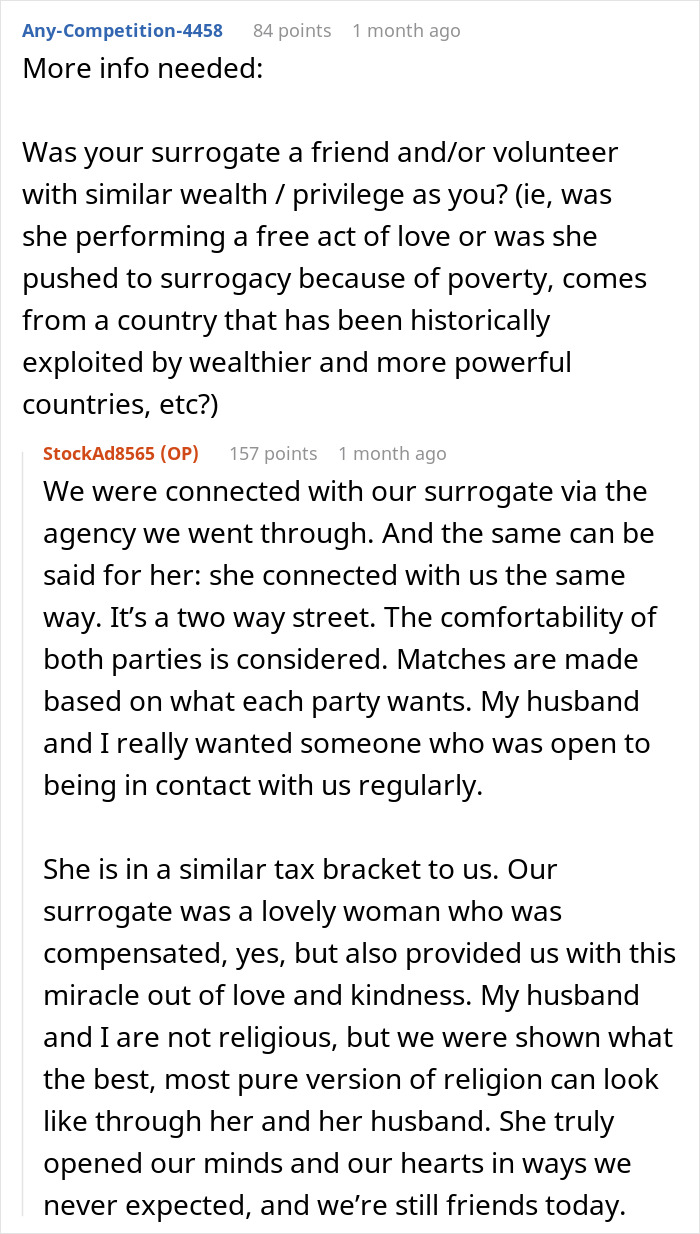
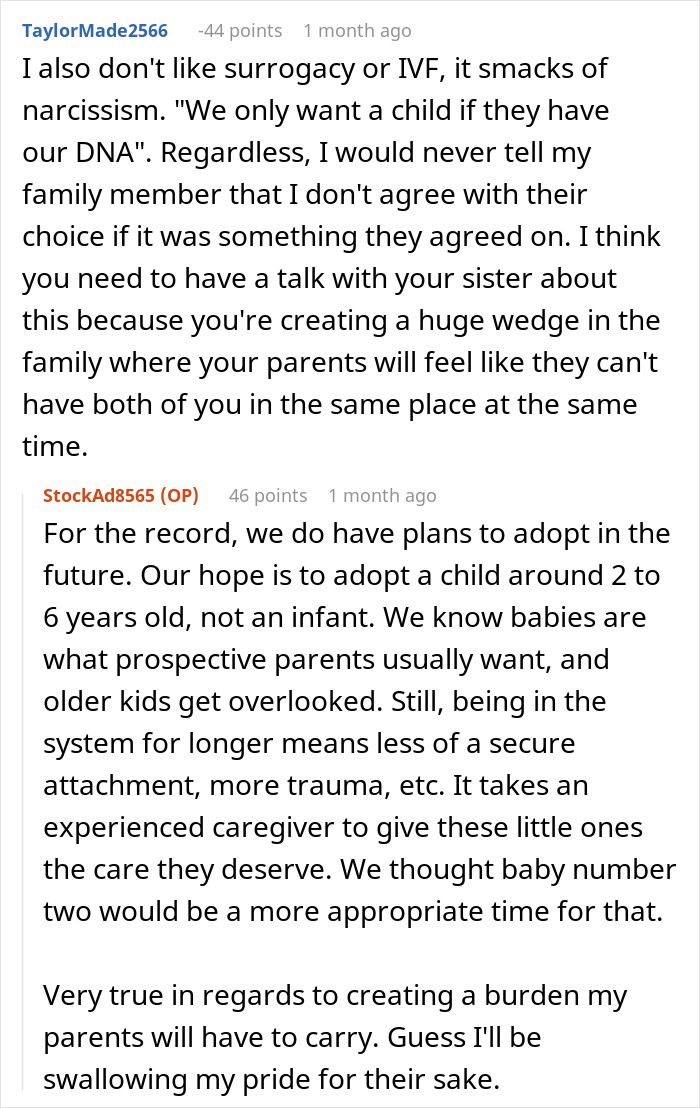
Many readers supported his decision to keep the baby away from his sister, given her repeated criticism

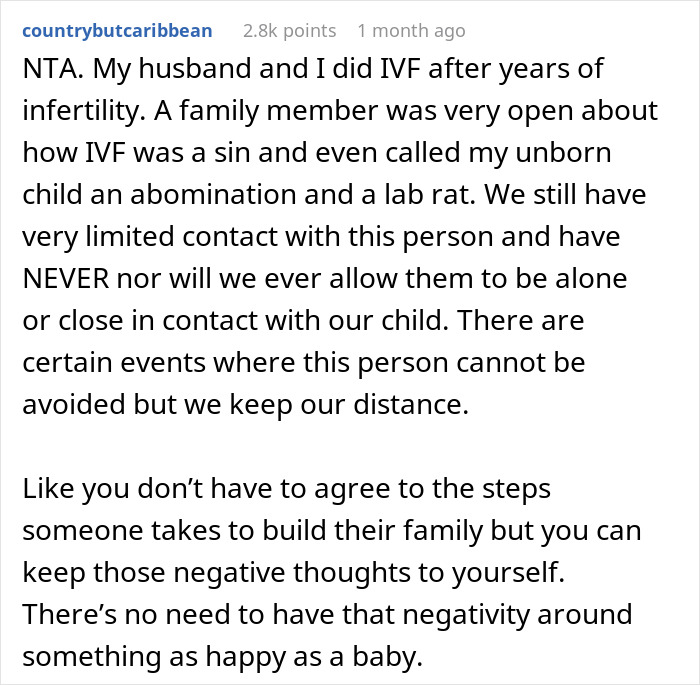
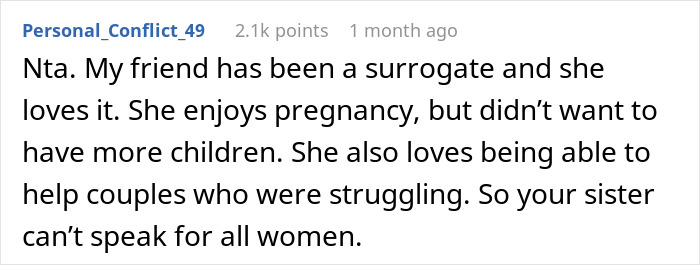
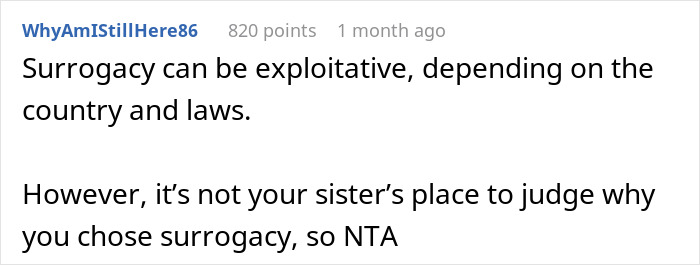



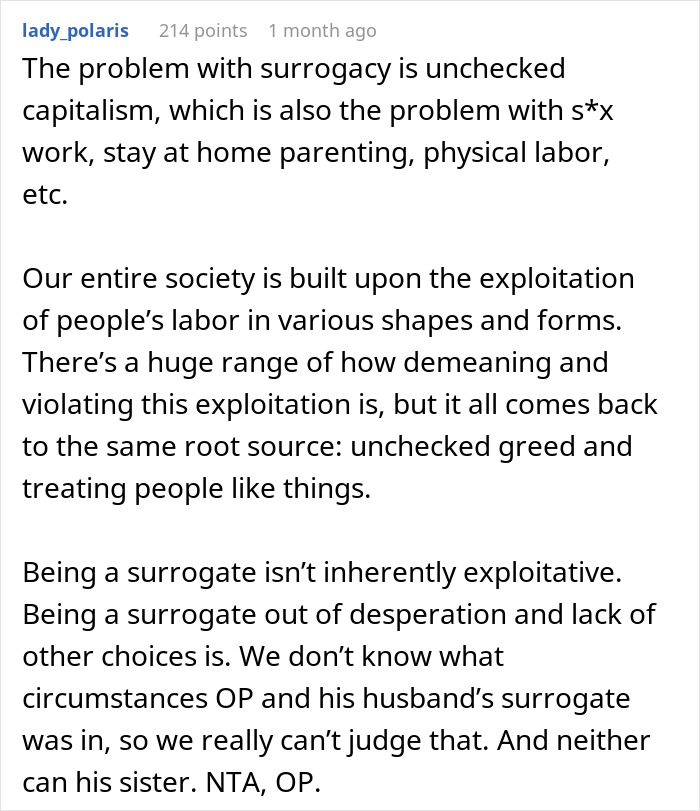
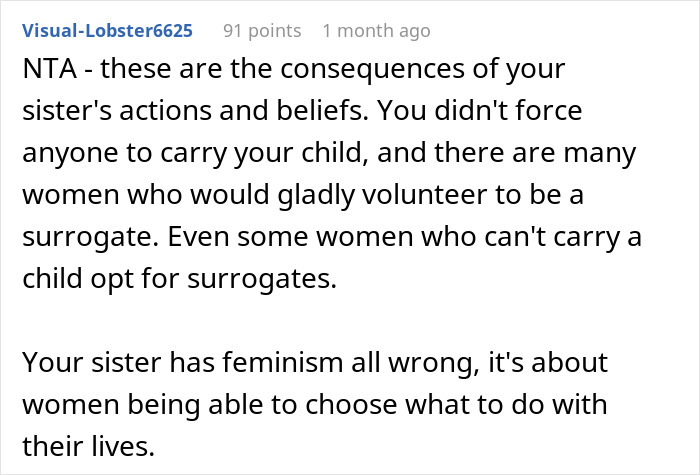
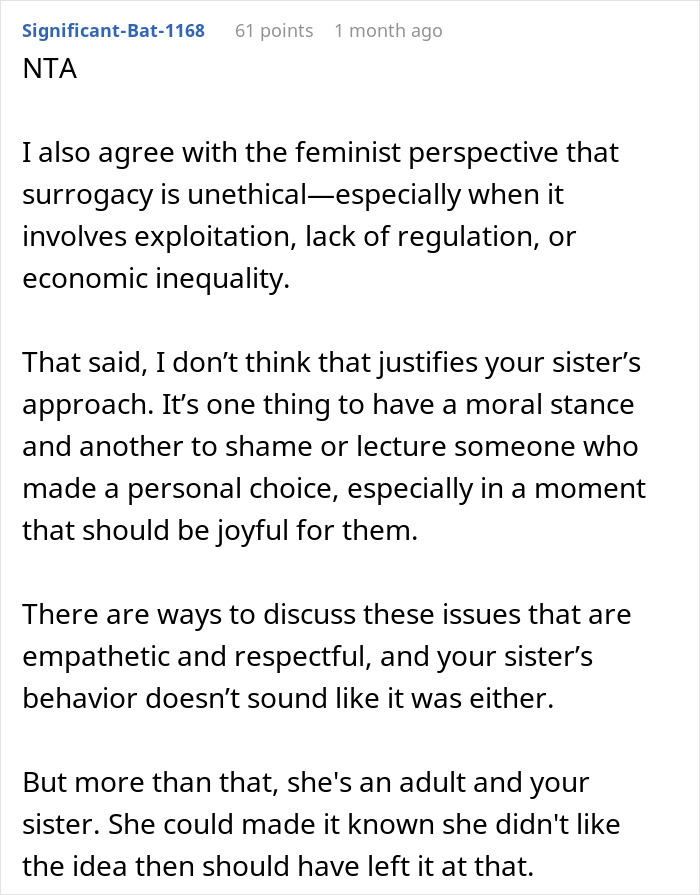
Others felt it was unfair and believed the sister had a right to express her concerns
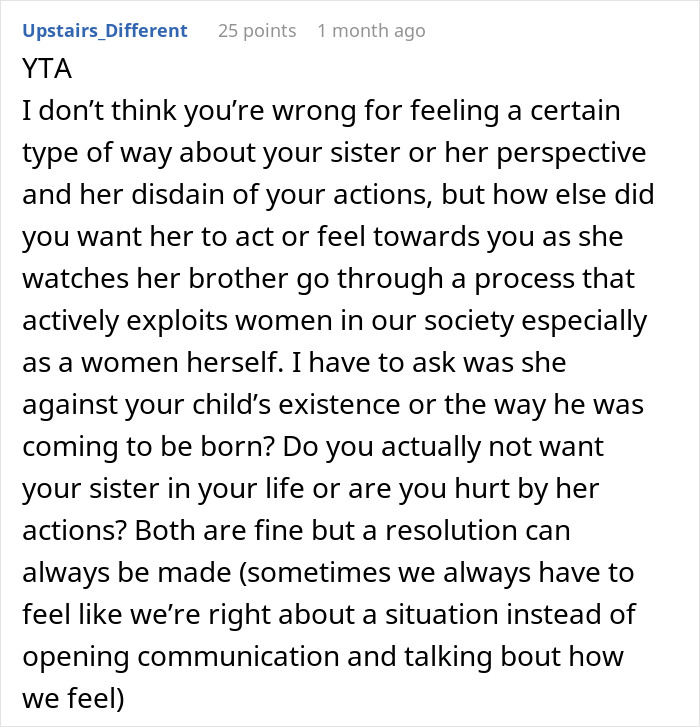
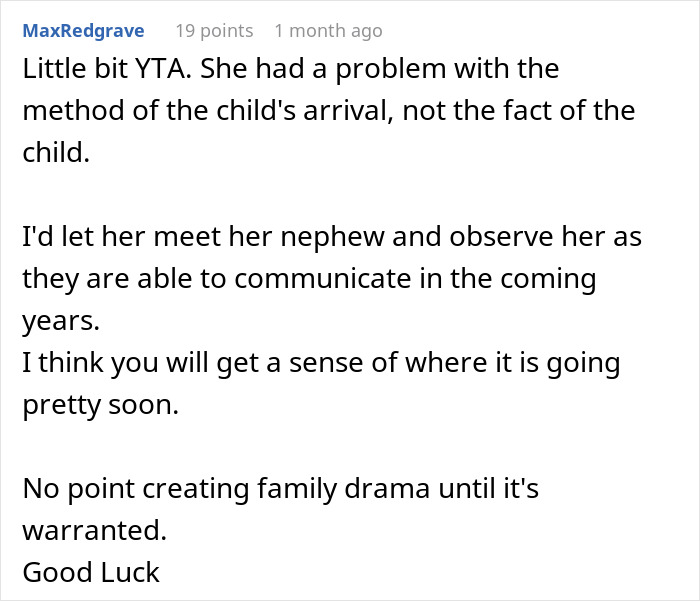
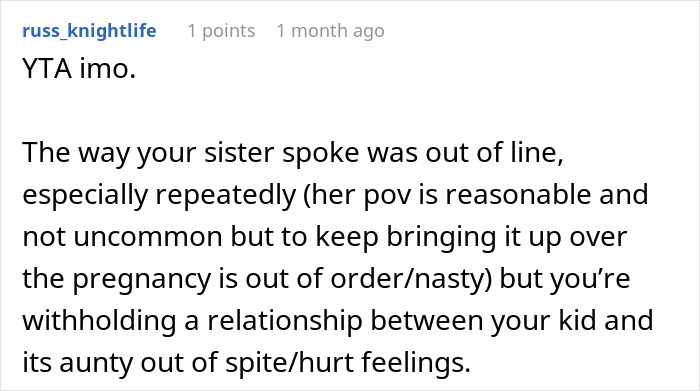
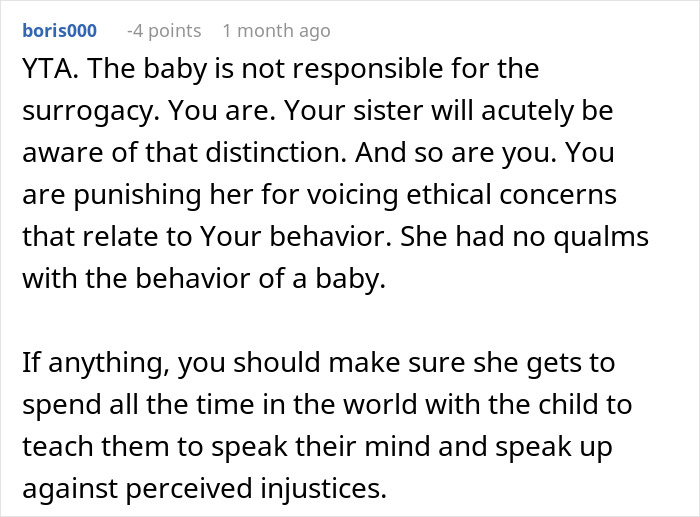
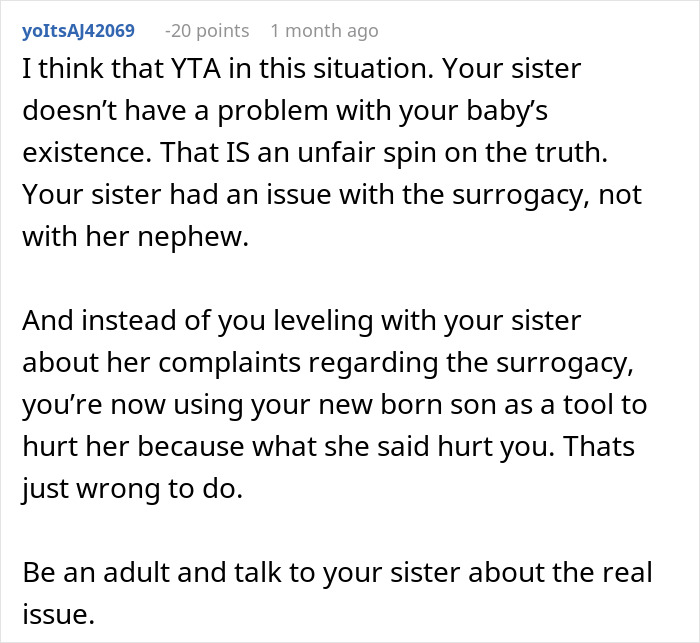
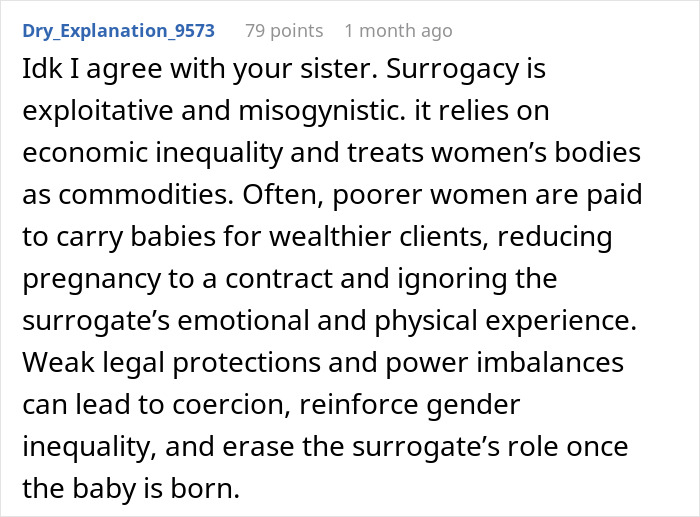
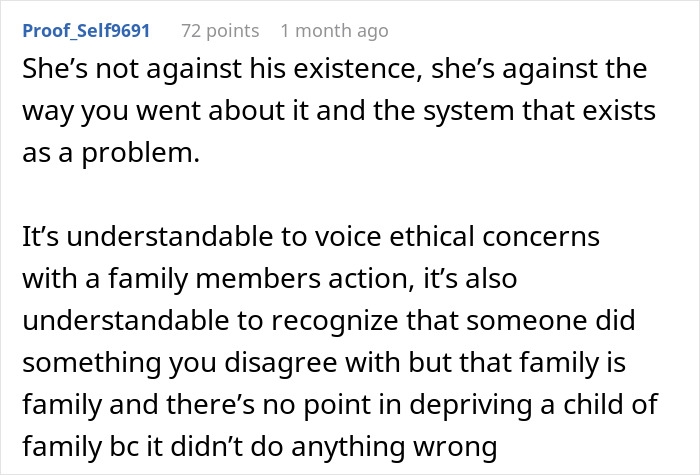
Some thought both sides mishandled the situation


While a few believed neither was entirely at fault
